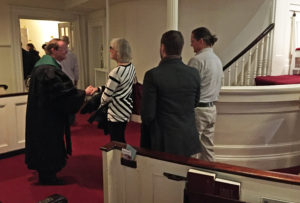When ministers write about giving, we begin with subtle disclaimers. I don’t like writing about this! I don’t mention this often!! I’M NOT LIKE OTHER MINISTERS WHO ASK FOR MONEY!!!
This Sunday in worship we will be thinking about how we give. Church fundraising experts point to several keys to effective stewardship—talking about money openly, guiding giving by grace rather than guilt, and not warning church attenders when Sunday’s worship is about giving.
Churches used to come up with corny themes for giving campaigns. “Stewardships that Fail to Sail,” “Taking the Stew out of Stewardship,” and “The Sermon on the Amount” say something incomprehensible.
The Bible has a lot to say on giving:
“God loves a cheerful giver” (2 Corinthians 9:7).
“The love of money is the root of all evil” (1 Timothy 6:10).
“Feasts are made for laughter; wine gladdens life, and money meets every need” (Ecclesiastes 10:19, but that one doesn’t sound right.)
Pithy quotes on giving can be enlightening:
“When I have money, I get rid of it quickly, lest it find a way into my heart” (John Wesley).
“Each of us will one day be judged by our measure of giving—not by our measure of wealth” (William Arthur Ward).
“A dead church doesn’t ask for money” (Clara Bess Eikner).
“I’d find the fellow who lost it, and if he was poor, I’d return it” (Yogi Berra—when asked what he would do on finding a million dollars in the street).
I could have written a negative article saying that if you do not give we may play an accordion rather than the organ, stop writing clever columns, or provide no more coffee.
Some of the most interesting articles on giving promise great rewards. Giving to the church leads to weight loss. Generosity will make you irresistible. People who give to the church live longer. (If it is not true it should be.)
Ministers are reticent to write about giving to the church for a variety of reasons. I am glad that I can unapologetically encourage people to give to Plymouth. When I write a check to the church—I’m old enough to still write checks—I’m happy to be part of a holy work. I believe in our shared ministry. Many of you already give sacrificially. Everyone can consider giving more.
As you think about giving, be brave enough to ask, “Do my gifts to Plymouth reflect how much I value this family of God?”



